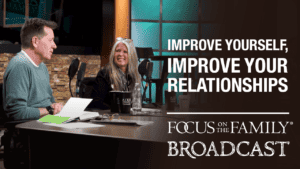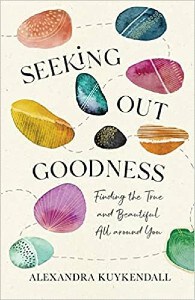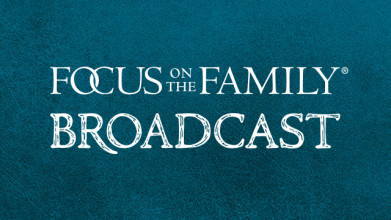
Improve Yourself, Improve Your Relationships
Drs. Les and Leslie Parrott explain how you can improve your marriage by becoming emotionally healthy, and examine three key aspects of good emotional health.
Home » Episodes » Focus on the Family Broadcast » Seeing Through Our Culture to Find God
Preview:
Alexandra Kuykendall: It’s very clear in Scripture, it doesn’t matter if people are kind to us, polite to us, respectful of us, we still are expected to be living through the Holy Spirit and believing the best in others. Because to love our neighbors well means we are doing our part in that prayer of Thy kingdom come, thy will be done.
End of Preview
John Fuller: That’s Alexandra Kuykendall. And she’s our guest today on Focus on the Family with Jim Daly. Thanks for joining us. I’m John Fuller.
Jim Daly: John, do you consider yourself to be a positive person?
John: I am trying every day to be more positive, Jim. It’s been a lifelong struggle.
Jim: I tend to look on the brighter side of things.
John: You do, yes.
Jim: I think that’s just a byproduct of life. And, you know, I can see how people in this world can be disheartened and discouraged. There’s a lot around us that could pull us down, especially the last couple of years. I mean it has been rough with the culture, with the pandemic, politics, division in our country, that 50-50 thing we always talk about. It’s easy to get overwhelmed with that doom and gloom feeling but the good news is, right there in the New Testament, the book of John, Chapter 16:33, Jesus tells us in the world, you’ll have tribulation, but take heart, I’ve overcome the world. Isn’t that a great statement? It’s kind of like-
John: I like how you delivered it too.
Jim: … don’t fret. Uh, those words are so comforting. And today, with our guest, um, we’re going to talk about leaning more in that direction, rather than into the fear of this life.
John: I’m looking forward to this. There’s some really good content in the book, Seeking Out Goodness written by our guest, Alexandra Kuykendall. She has um, been with us before. She’s a wife and mom of four girls. And somehow in between life, she finds time to write great books like this one, Seeking Out Goodness: Finding the True and Beautiful All Around You. And we’ve got copies of that here at the ministry. Call 800, the letter A, and the word FAMILY, or stop by focusonthefamily.com/broadcast.
Jim: Alex, welcome back to Focus.
Alexandra: Thank you. So good to be here.
Jim: Yeah, it’s great to have you. Um, I guess that that kind of that opening, salvo here is Are you serious? How can you be cheery in this kind of environment where we’re at each other’s throats, and you know, the country seems to be going, you know where? I mean, seriously? Do you want us to be happy?
Alexandra: Well, I think it’s not so much about happiness, or cheeriness as it is remembering that God has not left us.
Jim: So what does that called, confidence, maybe?
Alexandra: Yeah, I would say confidence. Walking through the world remembering that God is good. And He is with us. And He is still working in the world, especially in those moments when we think where is He? What is happening? I only feel darkness or sadness or frustration or fear right now.
Jim: Yeah.
Alexandra: to remember that God is good, and He is with us.
Jim: You know, Alex, so much of life is about expectations. You know, when we have failure in marriage, it’s usually around expectations. He’s not doing this or she’s not doing that. Parenting is around expectations. Oh, my goodness, I thought you’re a better student than that, right?
Alexandra: Right.
Jim: All that stuff. And then when you look at our Christian walk, and our relationship with God can be unfortunately about expectations, what we expect God will do for us.
Alexandra: Mm-hmm.
Jim: The country we live in, the neighbors we have, you know, our pastor, and how well he did on Sunday.
Alexandra: (Laughs) Right.
Jim: I mean, it’s a it’s a, just this never-ending expectation that we put on people. So in that regard with your book, and what you’ve been researching, how do we how do we get a better grip on what we expect out of the Lord? out of, it feels odd even saying it, but it’s true.
Alexandra: Yeah. You know, every day I wake up, and I look out the window of my office, and I live in Denver, my neighbor across the street has a big tree. And as the sun rises, I see the colors behind the tree. And now especially in winter, early spring, the branches create this silhouette. And I can either focus in on the branches, or I can focus in on the color behind them. And what I choose to focus in on is what then jumps out at me. So as we’re going through life, through our days through our very ordinary conflicts, uh, boring moments, frustrations, to say, Okay, God, I want to see you, I want to see you at work. And when we put that lens on, we are more likely to see evidence of him. It’s like the practice of gratitude, right, that the more we are grateful for how God is working in our lives, the more we’re going to see things to be grateful for. So it’s really about a mindset.
Jim: Well, I guess, are we different than 100 years ago, 2,000 years ago, is humanity still basically the same? It seems like there’s more avenues to express our discontent, more mechanisms,
John: Oh yes.
Jim: more technology that we can, right.
Alexandra: Mm-hmm. More public forums.
Jim: Yeah, I mean, so I mean, maybe it’s not the heart of people has changed, it’s just our capability and our technology has allowed us to be more demonstratively negative. But you know, what do you think in that the heart of mankind is still the same?
Alexandra: Absolutely. And I talked about in the book, the big arc of humanity is that we had creation, it was good. We had fall, separation, then reconciliation and redemption. That’s our big arc. And we see that pattern played out in the micro, throughout our days throughout our own lives and stories.
Jim: Yeah.
Alexandra: So the heart of the matter is the same. I don’t think that we have changed. And honestly, I don’t think that the world has changed all that much. We live in a sinful world. Yet, the things that are available to us right now. And the ways that we interact with each other are unique to this time. So how do we as people take this big macro story and live out reconciliation and redemption within the context of the tools we have.
Jim: Yeah.
Alexandra: Which could be technology, uh, could be within the context of a pandemic with technology, could be at this point in history, and for those living in the United States for this point in history right now, it, yes, it’s unique, and it’s not all at the same time.
Jim: No, I like that. You know, Jean, I noticed her this morning. My habit is I get up early and read the prep that the producers have created and go through the book and look for anything that sticks out. But Jean had picked it up, she really liked the cover, the title that caught her attention.
Alexandra: Ok.
Jim: And I think I think even as a woman, I think that idea of seeking goodness resonates with so many wives and moms, right? I just think women have a more natural bent to say that I’ve got to be experiencing more goodness in my life. They yearn for it. I’m not sure if men are as dialed in that way. And I don’t mean to be stereotypical, but um, I like it. I like the idea. It’s a battle. But in that regard, um, this idea of knowing truth has always been something I use here at Focus in management, you know, that we as managers have to know truth as best as we can, so we can correct issues and keep moving forward and honoring the Lord, et cetera. But boy, knowing truth in your life, outside of your vocation, knowing who you are, who God is, who you are in relationship to God, what your responsibility is as a husband, as a wife, as a mother or father, those are critically important things.
Alexandra: Mm-hmm.
Jim: You have a somewhat amusing illustration of that, cooking bacon.
Alexandra: Yeah.
Jim: But I love this idea of knowing truth, again, I’ll say as best as you can, as a human being in a sinful world, and with a sinful nature. But how do we go about doing that? And use your bacon analogy.
Alexandra: Okay, yeah. I call it the burning bacon principle because I have burned bacon plenty of times in life-
Jim: And that’s good too. I would eat burnt bacon. There’s no bacon that’s not edible.
Alexandra: So I cook bacon in my oven. And I often will forget that it’s in there, right, the smoke starts to indicate that there is a problem. And I can either deny that it’s burning, or I can recognize that it is, but often, we want to deny, we have new information about something that-
Jim: Smoke.
Alexandra: Yes, that might show us a new truth that we don’t want to believe because we are tied to the truth that we’ve been holding on to for a long time. And I just want to encourage us as believers, to walk into a pursuit of truth, holding a posture of humility.
Jim: Hmm.
Alexandra: To remember that God is God. And we are only able to understand this world with the human minds that we have. He gives us some good information in Scripture, He gives us these guidelines that we can live by. And at the same time, we are not God. And so to walk into every relationship and every conversation saying, yes, I want to think on what is true. And I don’t have the full picture of the world. I have the picture of my lived experience of what scripture tells me, and maybe what good counsel has told me. And with those three things, we can walk into the world looking for truth but still holding that posture of humility.
John: Hmm.
Jim: Right. The difficulty is when we are observing that truth through a biblical lens and others are not, the cancel culture is a great example. And I know people who have been fired from their jobs because they espoused Christian values, for example, traditional marriage. Um, and they lost their job over that. It seems unfair to me that we can no longer even tolerate a diversity of opinion on things. That, to me, it’s more insidious than I used that example of China where they had the one child policy, but the people of China would look at the man, government and say, ah, they’re heavy handed, and they’re forcing this policy on us. In the United States, to me, it’s more insidious, because it’s coming from the bottom up, from the social classes, that you need to behave a certain way. And if you don’t, we’re coming after you. It’s not from the government per se. Do you know what I’m saying?
Alexandra: Mm-hmm.
Jim: And so in that whole cancel culture environment, first describe what we think we mean by canceled culture, if you would, and then address that idea of knowing truth when I mean, we can’t even get it on the nightly news, because it’s all over the map.
Alexandra: Yeah. Well, it’s interesting, you know, I call myself a kitchen anthropologist, where I stand in my kitchen a lot, and I look at the world and I try to make sense of it. And so I was in the process of starting to write this book before the pandemic. And cancel culture was a thing before the pandemic. And by that, I mean, we take one person’s opinion on one issue, and we disagree with them on that particular issue, and then we cancel all of who they are. We disregard any good thing they might have to offer us any good wisdom, they might have to offer us because we disagree on one topic. And that’s painful to have experienced to us. But I think as sinful people, we have the propensity to do that as well, too. I can make assumptions about somebody because I know they voted a certain way. Or they think about a certain topic, a certain way. And I can instinctively cancel them myself. And so I want to be sure, not only that I’m protecting myself from cancel culture, but then I’m not perpetuating cancel culture. And that’s that posture of humility, right? To say, I want to give people the benefit of the doubt. And part of that is uh, believing the best in them. And saying, I believe that you’ve come to your opinion, because you have been thoughtful about it. And I am going to trust you to believe the same about me. Instead of going into conversations already ready for a fight, going in and saying, Okay, let’s believe we can have this kind of conversation.
Jim: Yeah, I’d like to push on you a little bit.
Alexandra: Okay.
Jim: And I think the scriptural references will be obvious, but maybe you can connect them for us. Because so often in that environment of the cancel culture, it’s a, I’d say a fleshly response to say, okay, we’ll just fight fire with fire, um, an eye for an eye, tooth for a tooth, right. So if that’s how that side, whatever it is, is going to pick on me and my side, then I’m going to pick on them the same way. That is very nonbiblical, right?
Alexandra: Mm-hmm.
Jim: That’s not what Jesus came to say. I mean, Luke 6 is pretty brutal. And it’s everything about how you love your neighbor. Those two paragraphs before that statement, are very demanding. If somebody asks you for your jacket, make sure you give them your shirt, if they ask you for money, give it and don’t expect payment back. And don’t just do it to those who love you, everybody could do that, even sinners,
Alexandra: Mm hmm.
Jim: but I’m telling you to do it to your enemies.
Alexandra: Mm hmm.
Jim: That is tough stuff.
John: Mm-hmm.
Jim: And I think in this context of how we fight back spiritually, it’s very different than what my flesh wants to do.
Alexandra: Exactly. And I talked about an experience I had in the book. Uh, I posted something on Instagram, something I thought was pretty innocent, about a historical moment. And I got-
Jim: Welcome to the booby trap.
Alexandra: Yes, you know, Instagram supposed to be nice and fluffy. Well, guess what? It’s not. I got all of these private messages. And some of them were from people that I didn’t know. Um, I thought people were taking it out of context, or it wasn’t what I intended. They were taking the message in a different way. But what hurt were people who knew me personally, and who said, I don’t know that I can trust you anymore. And I’m questioning your faith, because of this post that you had.
Jim: Right.
Alexandra: And one friend in particular, I was very hurt, and I really wanted to defend myself and I wanted to do exactly what you’re talking about. I wanted to say, wait a minute, and-
Jim: You’re not a good mother. (laughs)
Alexandra: Yeah. Well, and just come back with the comebacks, right?
Jim: Right.
Alexandra: And, and it took a lot of humility, and it took me stepping back and saying, I’m not going to respond in the energy of the moment. I’m going to pray through this, and I didn’t do it perfectly, because my instincts were to put up the fists and to fight, but I knew that wasn’t what peace making is about. Peacemaking is about that part of the process, we had creation, we had separation in our relationship, how am I going to move towards reconciliation and then redemption with this friend? And to do that meant to hold on to that posture of humility, and to approach her as I would want to be approached if the seats were switched, if I had been the one. And it’s just by God’s grace, that in that moment, I wasn’t the one who was going after her. Um, but I wanted to approach her like I would want to be approached, which is with gentleness, and self-control, and goodness.
Jim: Hmm.
John: Mm-hmm.
Alexandra: And s- but that meant that I needed to pause because my emotions in the moment weren’t going to allow me to do that.
Jim: One thing that always corrects my thought life is Romans 2:4 that says, ‘Don’t you know, it’s God’s kindness that leads one to repentance.’ And that is so true. If you’re ever in a heated debate with especially a non-believer, just remember that scripture. Who’s come to Christ going, you know, you Christians were so tough on me, and you treated me so harshly, I decided to become one of you.
Alexandra: Mm-hmm.
Jim: That’s not a testimony you ever hear. It’s man, I was mean toward those Christian people, and they just kept responding with love. And it caught me.
John: Well, you’re listening to Focus on the Family with Jim Daly. I’m John Fuller. And our guest today is Alexandra Kuykendall. And her book is Seeking Out Goodness: Finding the True and Beautiful All Around You. It really is a mind shift. And we encourage you to get a copy of this book from us. Just call 1-800, the letter A, and the word FAMILY, or stop by focusonthefamily.com/broadcast.
Jim: Alex, again, with Philippians 4:8, Paul encourages us to think on whatever is right. So this this complicates that idea of simply being kind, because there is something true that we need to stand up for, there is something right or righteous that we need to defend. And so often, that’s always the complication, right? Uh, the the softer side of the church is simply expressing too much love. And then the other end, it’s simply too much judgment.
Alexandra: Mm-hmm.
Jim: And these are the contradicting issues within the body of believers, right? What is God’s character here? What do we do? It’s both truth and love. And somehow God is the only one that can handle that successfully. I think we as humans struggle with that. But how do we defend what’s right without being offensive in the process?
Alexandra: Mm-hmm. Well, I think two things come to mind. I think of the Lord’s Prayer, ‘Thy kingdom come, thy will be done on earth as it is in heaven.’ And so when we are faced with something that we feel is not right, we can ask God, okay, what does it look like for your kingdom to come in this situation? And often if I’m having a conflict with somebody, a disagreement, the question I asked myself, and this is what I did with my friend, uh, when I felt offended by her comments, is, where would Jesus be standing in this conversation? Where would he be facing? What would his posture be?
Jim: Huh.
John: Mm-hmm.
Alexandra: And that is-
Jim: That’s a challenge. (laughs)
Alexandra: It’s really interesting to think of it in those terms, because suddenly, usually my heart softens towards the person I’m having a disagreement with. But also, Jesus isn’t going to let up on what’s wrong, right? He’s, he’s still going to push for what’s right, for that reconciliation and redemption to happen. But he’s going to do it in a way that um, offers gentle strength and kindness. And so I think about that, what does it look like for your kingdom to come God, in this situation? Where would Jesus be standing? Where would he be facing? And then I asked myself, how does the fruit of the Spirit play out here, because I can’t do this on my own. So I can say something is wrong. But if I say it in my own voice, in my own tone, it is going to come off as harsh, because my emotion, my feelings are going to be there. Those feelings aren’t bad. It’s that instinct in me that says this, something’s wrong. This isn’t right. And I want to stand up for it. But I need to do it in a way that is palpable to be effective.
Jim: Yeah.
Alexandra: And to be effective, I need the fruit of the Spirit because that, like you said, for a non-believer, is how they receive the good news. That’s how they receive God’s goodness when it comes at them through the fruit of the Spirit.
Jim: Well, and I’ve often said, you know, we’re not relying enough on the fruit of the Spirit, because those are the things that thankfully, Paul in the Spirit wrote down for us. I mean, that’s so funny that the Lord knew we need to know what the list is.
Alexandra: Yeah, right.
Jim: So we’ve got it right there. We just need to remember it and apply it. But you know, love, joy, goodness, peace, mercy, kindness, I mean, it’s all right there. We fail, I think to read right above it again in Galatians 5:19, where it’s describing the fruit of the other guy, you know, right?
Alexandra: Mm-hmm.
Jim: Satan, and you know, once you get beyond sexual debauchery, it cuts close. Division, disunity, lying, conniving. I mean, those are things that we can all do, and we can all be prone to. So I try to memorize both lists, one to know what God expects of me, and then what not to do, and we can easily lean into those things. Um, Alex, let me ask you to your friend, Rachel, uh, is a good example of balancing the right thing. Describe her and her husband, James, what they were facing, and that example it gave to you.
Alexandra: Mm-hmm. Yeah, so Rachel and James were experiencing uh, secondary infertility. And they thought, Okay, well, maybe we’d be open to adoption. And so they went to a training at Project 127, here in Colorado.
Jim: Yeah.
John: Oh, yeah.
Alexandra: And they um, were interested in fostering in order to adopt a child to be part of their family.
Jim: So that was their goal.
Alexandra: That was their goal when they went in. So a good goal, right, that that’s a good goal. And as they learned about the foster care system, and the needs of foster kids to have safe temporary housing, they decided they would be open to that. And as they got to know, they, their birth parents have their first placement, um, they had two boys that were placed with them, they realized these parents were working very hard to do the things they needed to do to create a safe home for the kids to return to. And all of a sudden, Rachel and James had a broader understanding of how complicated the situation was. It wasn’t just an easy, right or wrong. And they started cheering for the birth parents, because they knew that in the end, if these parents could get sober, do the things they needed to do, it really was in the best interest of these boys to return home to their birth parents. And they have continued to foster, and they are still open to adopting a child through foster care. They haven’t adopted a child yet. Um, but they have seen that there is a larger story at play, that they can be part of, and that, they went in with a certain end to the story, and they realized they might be part of a bigger story that God has orchestrated them to be part of. And the thing that Rachel said to me that stuck out when I was talking to her about this, to write about it in the book, is she said, “We decided to give up the good for the sake of the best.” Like their idea of going in and adopting kids out of foster care was a good idea. Their idea of then cheering for birth parents as they fostered their children and kept them safe, while the birth parents did what was needed was best for those kids. And so they were giving up their own dream of good for the sake of the best. And that’s what I think doing what is right is about and that’s why I call the chapter, Having Moral Courage, Developing Moral Courage, because it’s scary, and that’s hard. And they’ve experienced a lot of heart ache as foster parents because they’ve grown attached to kids. And then they’ve had to let those kids leave their homes and, but they believe that they are doing good as a family and giving up their good plan for the sake of the best.
Jim: Yeah, what I like about what you’re saying is knowing the mission. So they had an idea of what that mission is, it’s for us to potentially adopt and give this child we adopt out of foster care a beautiful life. That’s a good thing.
Alexandra: Mm-hmm.
Jim: But they failed to realize, and Jean and I were in the same boat, so I’m speaking from our own experience. We had probably 15 kids when we were fostering through the home. And we had that same idea. Is there anyone we can adopt? And so we went exactly through that same pain and realizing and that’s not the mission, the mission is reconciliation with their birth parents, right?
Alexandra: Mm-hmm.
Jim: But in that same context, it’s true culturally, I want to bring us back to that. What is the mission?
Alexandra: Mm-hmm.
John: Hmm.
Jim: And what you’re saying when you get down to it, what is our mission as we engage people that really push our buttons and drive us the wrong way, Alex? I mean, really? Is there a mission in here other than subdue, conquer?
Alexandra: Yeah, right. Well, I think Jesus is pretty clear about what our our big mission is, right? Back to the macro plan,
Jim: Yeah, give it to me.
Alexandra: … is to love God with all of who we are and to love our neighbors, as we would want to be loved ourselves. And,
Jim: I don’t like that mission so much.
Alexandra: Yeah, it’s hard.
Jim: The second part.
Alexandra: It’s hard.
Jim: It is hard.
Alexandra: Especially if we are not feeling that same love, right?
Jim: Right.
Alexandra: And you said it’s very clear in Scripture, it doesn’t matter if people are kind to us, polite to us, respectful of us, we still are expected to be living through the Holy Spirit and believing the best in others because, to love our neighbors well means we are doing our part in that prayer of, ‘Thy kingdom come, thy will be done.’ If we carry this posture of humility, love people well, show them the fruits of the Spirit, that is about as good a life as we can live walking this planet, as missionaries to the world, because people will see God’s goodness manifested in our lives. Not because of us, but because of him working in us.
Jim: And I think for the church, Alex, I want to end here, but it’s a tough question. We’re at a crossroads. Where we take on the character of Christ, and we fight with the fruit of the Spirit, which one social warriors said to me one day, who’s not a Christian, he’s a Jewish gentleman. And he said, “Jim, don’t you know you’re in an alley fight, and the other side has switchblades?” And I said, “Yeah, we’re not stupid, we get that. But our weapons are love, joy, peace, goodness.” He went, “Wow, those are bad weapons.” I mean, that is exactly what the world would say. When you’re fighting hate with love, that’s not, you know, you got an eye for an eye back to that. And we need to recalibrate and understand what the big mission is, what Jesus has us here to accomplish. And Alex, this has been so good. I’m grateful. Thanks for writing down so much of what I’ve been thinking about, you know, the heart of it, and trying to get people to remember what the main mission is. And you’ve done a wonderful job in your book, Seeking Out Goodness: Finding the True and Beautiful All Around You.
John: Mm-hmm.
Jim: Thanks for tackling a really hard issue. I appreciate it.
Alexandra: Thank you.
Jim: And let me encourage you, if you’d like to, I’d say it this way, get closer to the Spirit of God and make sure that you know, um, what spiritual battle’s all about, I’d encourage you to get a copy of Alexandra Kuykendall’s great book. And you can do that right here through Focus on the Family. Uh, get in touch with us, and when you do, if you can make a gift of any amount on a monthly basis or a onetime gift, we’ll send it to you as our way of saying thank you.
John: You know, we’ve got lots of great resources. And of course, Jim, as you said the book from our guest, Seeking Out Goodness: Finding the True and Beautiful All Around You. Look for that at focusonthefamily.com/broadcast or call 1-800, the letter A, and the word FAMILY. 800-232-6459. On behalf of Jim Daly and the entire team, thanks for joining us today for Focus on the Family. I’m John Fuller inviting you back as we once again help you and your family thrive in Christ.

A popular speaker and writer for moms around the nation, Alexandra Kuykendall is the co-hostess of The Open Door Sisterhood Podcast. She has contributed to other nationally known publications and authored three books: Loving My Actual Life, Loving My Actual Christmas and The Artist’s Daughter. Alexandra resides in Denver, Colorado, with her husband, Derek, and their four daughters. Learn more about Alexandra by visiting her website, www.alexandrakuykendall.com.

Receive Alexandra's book Seeking Out Goodness for your donation of any amount!

Visit our online store and purchase a CD of today's program for yourself or to share with a friend.

Can kids be good on their own? Show them what goodness really is with these age-appropriate activities.

Though we can't fully understand God's message without encountering the truth of His Word and the gift of His Son, we can reinforce who God is through the hearable, seeable and touchable world around them.

Kindness is one of the few things that will gentle the response of others. Teach kids how to show kindness to others.

Alexandra Kuykendall describes a nine-month experiment she undertook to renew her appreciation for daily life with her husband. She encourages married listeners to embrace life with their spouse by finding joy and contentment in everyday moments.

Author Alexandra Kuykendall encourages us to move forward with purpose and intentionality so that we can continue nurturing those values and avoid allowing busyness to consume our families again.

When your tweens ask about the homeless, do you know how to respond? Read about ways to engage your tweens’ growing sense of observation and justice.

Dr. Erwin Lutzer describes how socialism is seeping into our nation through critical race theory, cancel culture, and the suppression of free speech, and he encourages Christians to persevere in defending biblical values while exemplifying God's grace and love. (Part 1 of 2)

In a discussion based on his book Christians in the Age of Outrage, Ed Stetzer discusses the importance of Christ-followers engaging others in a loving, kind and respectful manner, especially when there's sharp disagreement on divisive cultural issues.

Drs. Les and Leslie Parrott explain how you can improve your marriage by becoming emotionally healthy, and examine three key aspects of good emotional health.

Parenting can be intense, especially raising young children. Moms, especially, have a desperate need for God’s help every single day. Sarah Holmstrom and Stephanie Thurling want to encourage families to make prayer time a regular part of their routine, and they suggest fun games and traditions that can help get your kids more engaged with prayer.

Jean Marie Davis lived a horrific life as a sex trafficking victim for more than 20 years, where she was verbally and sexually abused, tortured, threatened by guns, and forced to live as a prostitute. She finally found freedom when she was invited to a pregnancy resource center (PRC) and introduced to Jesus Christ. Jean discovered her new identity in Christ, found practical help and a new life, and today is the executive director of a PRC in Vermont. (Part 2 of 2)

Larnelle Harris shares stories about how God redeemed the dysfunctional past of his parents, the many African-American teachers who sacrificed their time and energy to give young men like himself a better future, and how his faithfulness to godly principles gave him greater opportunities and career success than anything else.

Amy Carroll shares how her perfectionism led to her being discontent in her marriage for over a decade, how she learned to find value in who Christ is, not in what she does, and practical ways everyone can accept the messiness of marriage and of life.

Jonathan McKee offers parents practical advice and encouragement in a discussion based on his book If I Had a Parenting Do Over: 7 Vital Changes I’d Make.